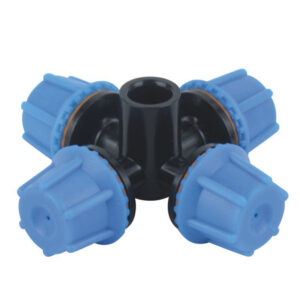When selecting an insect prevention sprinkler for your irrigation system, several factors should be considered to ensure effective insect control and optimal irrigation performance. Here are some key factors to consider:
Insect Control Mechanism:
Different insect prevention sprinklers employ various mechanisms to deter or control insects. Some sprinklers use chemicals or insecticides, while others rely on physical barriers or deterrents. Consider the specific insect pests you are targeting and choose a sprinkler that utilizes a mechanism suitable for controlling those particular insects.
Targeted Insect Species:
Identify the specific insect species that pose a problem in your area or for your crops. Different insects may have varying habits, behaviors, and sensitivities to control methods. Select a sprinkler that is designed to effectively target and control the specific insect species you are dealing with.
Environmental Impact:
Assess the environmental impact of the insect prevention sprinkler system. Consider whether the methods used are environmentally friendly, pose minimal risks to non-target organisms, and comply with any relevant regulations or guidelines. Opt for solutions that prioritize sustainability and minimize negative effects on the ecosystem.

Compatibility with Irrigation System:
Ensure that the insect prevention sprinkler is compatible with your existing irrigation system. Consider factors such as the sprinkler’s flow rate, pressure requirements, and installation compatibility with your irrigation setup. The sprinkler should integrate smoothly into your system without compromising its performance or causing any disruptions.
Coverage and Distribution:
Evaluate the coverage and distribution capabilities of the insect prevention sprinkler. It should effectively cover the target area and provide uniform application of the insect control mechanism. Consider factors such as spray pattern, distance, and adjustability to ensure adequate coverage for your specific needs.
Maintenance and Refilling:
Consider the maintenance requirements and refilling process of the insect prevention sprinkler system. Assess how often the system needs to be refilled or serviced and whether it aligns with your maintenance capabilities and schedule. Choose a system that offers convenient maintenance procedures and a reliable supply of insect control substances if applicable.
Cost Considerations:
Evaluate the cost implications associated with the insect prevention sprinkler system. Consider the initial purchase cost, ongoing maintenance expenses, and the cost of insect control substances if needed. Compare different options in terms of their effectiveness, longevity, and overall value for money.
Expert Advice and Reviews:
Seek expert advice and consult with professionals or experienced users who have utilized insect prevention sprinklers. Read reviews and gather information about the performance, effectiveness, and reliability of the sprinkler systems you are considering. Real-world experiences and feedback can provide valuable insights for making an informed decision.
By considering these factors, you can select an insect prevention sprinkler that aligns with your specific needs, effectively controls insects, and integrates well with your irrigation system.